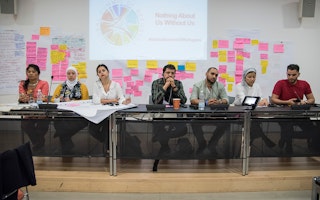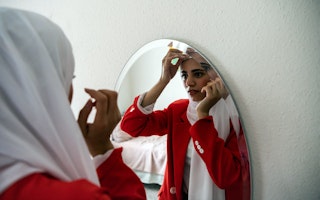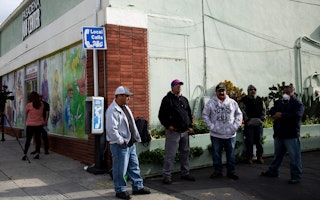Q&A: Empowered Refugees Lead the Way

Refugee leaders across the globe—from Indonesia to South Africa—are stalwarts in their communities, providing much needed services and support. During the COVID-19 pandemic, their work is more critical than ever. Recently, the Open Society Foundations’ Khairunissa Dhala spoke with John Jal Dak, the founder of Youth Social Advocacy Team, based at the Rhino Refugee Camp in Uganda, about the work he does to strengthen his community against COVID-19.
Where is the Rhino Refugee Camp?
The Rhino Refugee Camp is in a remote corner of northwestern Uganda and hosts over 120,000 refugees—mainly from South Sudan. I arrived here as a refugee in 2014.
What does the Youth Social Advocacy Team do?
We are a refugee-led peace building and advocacy organization. We are focused on empowering refugee youth and refugee women, and transforming lives through peaceful co-existence, conflict resolution, and livelihood development.
What has the Youth Social Advocacy Team been doing to fight COVID-19 on the front lines?
News of COVID-19 was not taken seriously in the beginning because people lacked the right information. Misinformation and rumor were rife; people believed that the virus would not affect them or that it was something invented by the government. But after family members over the border in South Sudan started to report cases to their family here, people realized it was a reality.
We’ve responded by conducting regular public information campaigns, through radio broadcasts and by sending teams—equipped with megaphones—on bicycles, to relay messages explaining the do’s and don’ts for COVID-19, translated into the nine languages of the refugee communities.
What challenges do you face as you try to promote safety and public health in these conditions?
So far, we have had no confirmed cases of COVID-19. Currently, though, we lack testing kits. Due to porous borders, it is not possible to regularly screen new arrivals, though we have been able to encourage some newcomers to stay at a self-isolation center when they arrive.
Some dwellings may have up to 15 people living in them, so social distancing is impossible. In this environment, there is a high risk of infection spreading—quickly. So, we have been calling on the government and donors to help us make soap and sanitizer widely available in community centers, and to promote the use of face masks.
Along those lines, what is the purpose behind the #1MMasks4Refugees campaign?
Our frontline workers assisting with food distribution are meeting people throughout the day, so we want to be able to protect them and the wider community. Other refugees who need to collect water, and visit the market daily, also come into close contact with others. Culturally and practically speaking, it is a challenge to prevent people from shaking hands and touching surfaces; therefore, face masks present the best form of protection.
The government has made the wearing of masks compulsory, and we are helping members of these communities accustom themselves to wearing them. At all community meetings here, for example, face masks are required. Our local tailors have begun to make masks; but, right now, the numbers are insufficient, so we are advocating for increased funding to ramp up production and distribution.
Uganda has received widespread acclaim in the international community for policies that allow refugees to move freely, work, and own land. You’re on the ground; does the reality you see align with this narrative?
It’s fine here compared to other camps in the world, where refugees are confined. But the land fills up quickly, and due to the remote location, promoting business and economic development is a challenge. Though we are given land, it is up to us to negotiate and mediate with the hosting communities over territorial disputes and matters of shared environmental resources, which requires overcoming significant language barriers.
Our group has organized intercultural exchange and learning visits, inviting different communities into each other’s space to learn from one another and build trust. We know that the government does not have the capacity to provide everything for us, which is why we are trying to change mindsets and help people become self-reliant. But in light of the outbreak of COVID-19, we are also calling for basic support.
As well as preparing for COVID-19, what are the other priorities at Rhino Camp?
There is a huge difficulty in accessing education beyond primary level, and without that a lot of young people become idle and vulnerable to the hate speech and tribalism that fueled the conflict in many of our home countries. This is why our group focuses on encouraging entrepreneurship—managing shared environmental resources, crop cultivation, water supply, and waste management.
If you have a project to sustain you, and a sense of ownership, you are less likely to be mobilized to fight. However, food supply remains a big issue. The World Food Programme has recently reduced rations by 30 percent, for example, so people are asking: How can we fight COVID-19 when we are hungry?
Why is it so important that attempts to help or empower refugees include—and truly listen to—the voices of refugees themselves?
We are living at a particularly tenuous time in Rhino Refugee Camp. We know too well how dangerous it will be for our community if the COVID-19 virus arrives here. We are on the ground, and we have the skills and ambition needed to ensure that our communities stay healthy and well. We need to be heard.


